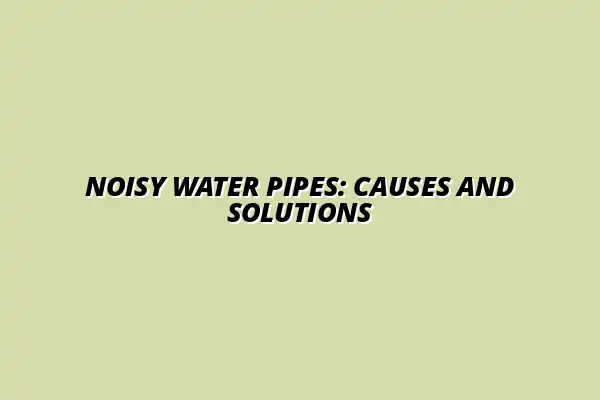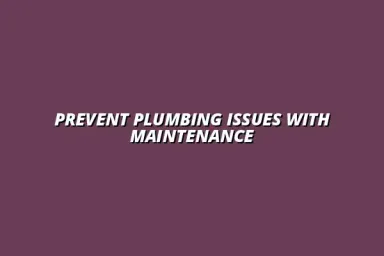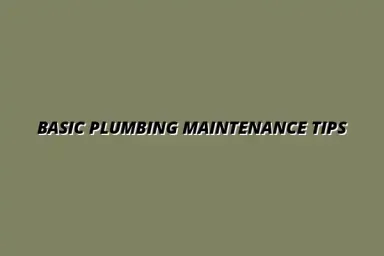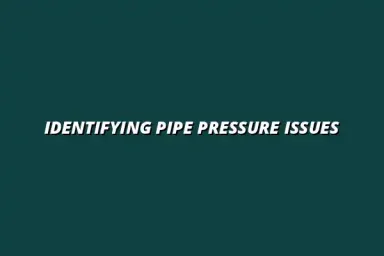Understanding Noisy Water Pipes: Causes and Impacts
Noisy water pipes can be quite annoying and can disrupt the peace in our homes. Understanding these noises is the first step to addressing them effectively. In this section, we will explore the common symptoms, the primary causes, and the overall impact of noisy water pipes in our daily lives.
Identifying Common Symptoms of Noisy Water Pipes
Before diving into the causes, it's essential to recognize the symptoms of noisy water pipes. You might hear sounds like banging, clanging, or even hissing at various times. These noises can indicate underlying issues that need attention.
- Banging sounds: Often referred to as water hammer.
- Hissing or whistling: Usually a sign of high water pressure. For help preventing high water pressure issues in your bathroom, check out this guide on preventing bathroom water pressure problems.
- Gurgling or bubbling: Can indicate trapped air in the pipes.
Types of Noises Produced by Water Pipes
The type of noise produced can help narrow down the source of the problem. For instance, if you hear a loud bang when turning the water off, that’s typically water hammer. On the other hand, a constant hissing sound might point to high pressure issues.
It's crucial to pay attention to the different sounds and their patterns. Knowing when and how often these noises happen can provide valuable clues for identifying the underlying problems.
When to Seek Professional Help
If the noises persist despite your attempts to locate the cause, it might be time to seek professional help. Ignoring these issues can lead to more significant problems down the line. A qualified plumber can assess the situation and recommend the best course of action. For example, if you are experiencing issues in Billesley, Birmingham, you can find a local plumber here.
Additionally, if you experience any water leaks or significant changes in water pressure, contacting a professional immediately is essential. They can help prevent further damage to your plumbing system.
Exploring the Primary Causes of Noisy Water Pipes
Now that we’ve identified the symptoms, let's delve into what causes these noises in the first place. Various factors can contribute to the sounds of noisy water pipes, and understanding them is crucial for effective solutions.
Water Hammer: Causes and Effects
Water hammer occurs when a sudden change in water flow creates a shock wave that causes pipes to bang against each other or their supports. This can happen when a valve is closed abruptly, causing the water's momentum to create a loud noise.
The effects of water hammer can be more than just annoying. Over time, it can lead to damage in the pipes or even loosened fittings, increasing the risk of leaks. Addressing it quickly is important to avoid further complications!
Loose Pipes and Their Contribution to Noise
When pipes are not secured properly, they can move when water flows through them, causing noise. This movement can lead to vibration sounds, which often sound like rattling or banging. Securely fastening the pipes can help mitigate this issue. For information on maintaining your pipes and averting potential issues like bursting pipes, check out this guide on essential plumbing maintenance for homes.
- Use pipe straps to secure loose pipes.
- Check for any gaps that might allow movement.
- Consider adding cushioning material to reduce vibration.
High Water Pressure and Its Impact on Pipe Noise
High water pressure can cause loud noises in water pipes, often leading to whistling or hissing sounds. If your water pressure is higher than recommended, it can strain your plumbing system and cause damage over time. Low kitchen water pressure can be especially problematic. Learn how to fix it here.
To prevent noise and potential damage, it’s wise to check your water pressure regularly. Most homes should maintain a water pressure between 40-60 psi.
Air Trapped in Pipes: The Silent Trouble Maker
Air bubbles in plumbing can cause gurgling noises and affect water flow. When air gets trapped in the pipes, it creates pressure changes, leading to sounds when water is running.
If you suspect trapped air, try running the water for a few minutes to flush it out, or consider bleeding the system if you have radiators or a similar setup!
Corrosion and Its Role in Pipe Noises
Corrosion in pipes can lead to rough surfaces that create friction when water flows through, causing noise. Older pipes, especially those made from metal, are more susceptible to corrosion, leading to more noticeable sounds. Understanding the causes of bursting water pipes can help you prevent serious damage. Check out this article on causes of bursting water pipes.
Regular inspections can help catch corrosion early. If you notice discolored water or frequent noises, it might be time to consider replacing older sections of your plumbing.
Understanding the Effects of Noisy Water Pipes on Daily Life
The impact of noisy water pipes goes beyond just irritation. These sounds can affect your overall home comfort and even lead to potential plumbing issues if left unchecked. Let’s examine how these noises can disrupt daily life.
The Impact on Home Comfort and Peace
Noisy pipes can transform a peaceful home into a noisy environment. Imagine trying to relax or sleep while the pipes bang or whistle constantly! This disruption can lead to increased stress levels.
Maintaining a quiet home is important for mental well-being and overall comfort. Addressing noisy pipes can significantly improve your living space!
Potential Damage to Plumbing Systems Over Time
Ignoring noisy water pipes can lead to larger plumbing issues in the future. Over time, persistent noises often indicate wear and tear, which can result in leaks, water damage, or even costly repairs. For example, a leak under the foundation can cause significant damage – find out how to fix it here.
Taking action as soon as you notice the signs can save you both time and money in the long run. It’s always better to address potential problems early!
Frequently Asked Questions About Noisy Water Pipes
What Causes Water Pipes to Make Noise?
There are several reasons why water pipes might make noise, ranging from minor issues to more significant problems. Common causes include water hammer, loose pipes, and high water pressure. Additionally, trapped air and corrosion can contribute to these annoying sounds.
Understanding these causes is essential for addressing the issue effectively. Most often, the noise can be traced back to specific plumbing conditions or adjustments that need to be made. Let's explore some of the main contributors to noisy water pipes.
- Water hammer: Sudden changes in water flow
- Loose pipes: Movement and vibrations as water flows
- High water pressure: Increased strain on the plumbing system
- Trapped air: Bubbles that cause rattling noises
- Corrosion: Deterioration leading to noisy pipes
Are Noisy Water Pipes Dangerous?
Noisy water pipes aren’t just an annoyance; they can also signal potential problems. While some noises may be harmless, others can indicate that there is a serious issue that needs attention. For example, water hammer can lead to pipe damage if left unchecked. Noisy water heaters are another common issue. Learn how to troubleshoot them here.
It's important to recognize the difference between normal sounds and those that suggest danger. If the noises are persistent and disruptive, it’s a good idea to investigate further and possibly consult with a plumber.
- Frequent banging or clanking sounds
- Signs of leaks or water damage
- Decreased water pressure
- Unusual pipe vibrations
- Corrosion or rust on pipes
Can I Fix Noisy Water Pipes Myself?
Many homeowners may wonder if they can tackle noisy water pipes on their own. Depending on the source of the noise, DIY fixes can sometimes be effective. Simple adjustments like lowering water pressure or securing loose pipes might be within your skill set.
However, it’s essential to know your limits and understand when to call for professional help. If the problem persists or is severe, seeking expert assistance is often the best route.
- Assess your plumbing knowledge and skills
- Consider the complexity of the issue
- Evaluate whether tools and materials are readily available
- Monitor the results—if no improvement, seek help
Final Thoughts on Managing Noisy Water Pipes
Importance of Regular Plumbing Maintenance
Regular plumbing maintenance is essential to prevent noisy pipes and other plumbing issues. By routinely checking your plumbing system, you can catch problems before they escalate. This proactive approach will save you time, money, and stress in the long run.
Some key maintenance practices to consider include:
- Inspecting pipes for leaks or corrosion
- Checking water pressure regularly
- Clearing air from the plumbing system
- Securing any loose pipes
- Scheduling professional inspections as needed
Encouraging a Peaceful Home Environment Through Effective Solutions
Addressing noisy water pipes not only improves your plumbing but also enhances your home's comfort. A peaceful environment contributes to overall well-being. By applying effective solutions, you can create a serene setting where the sounds of plumbing don't disrupt your daily life.
Simple steps, like securing loose pipes or adjusting water pressure, can make a significant difference. Additionally, investing in long-term solutions will ensure a quieter home for years to come. Remember, a little effort goes a long way!
Contacting Professionals for Persistent Issues: A Proactive Approach
If you've tried DIY solutions and the noise continues, it might be time to contact a professional plumber. They can diagnose the issue accurately and recommend the best course of action. This proactive approach helps to prevent further damage and ensures your plumbing system functions smoothly.
When seeking help, consider these factors:
- Look for licensed and insured professionals
- Read reviews or seek recommendations
- Request estimates before starting any work
- Ensure they guarantee their services
Taking these steps will help you find the right expert to address your noisy water pipes effectively!

 Kiran Almasi
Kiran Almasi

